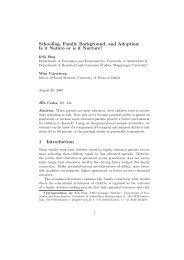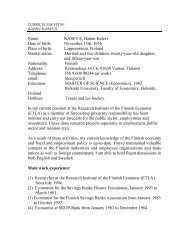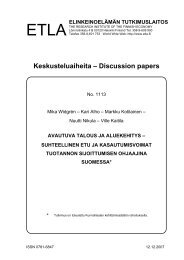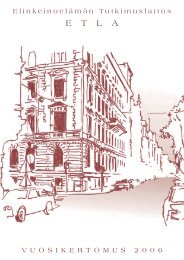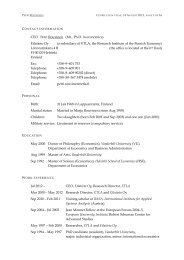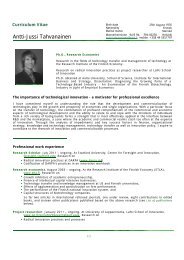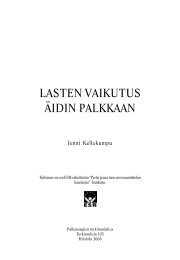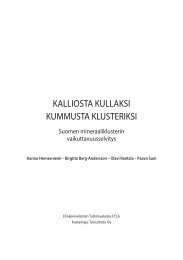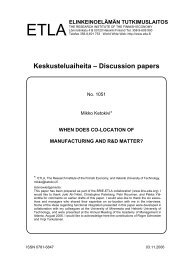Sergey Boltramovich, Grigory Dudarev, and Vladimir Gorelov ... - Etla
Sergey Boltramovich, Grigory Dudarev, and Vladimir Gorelov ... - Etla
Sergey Boltramovich, Grigory Dudarev, and Vladimir Gorelov ... - Etla
You also want an ePaper? Increase the reach of your titles
YUMPU automatically turns print PDFs into web optimized ePapers that Google loves.
21<br />
nowadays limits the possibilities for development of the cluster <strong>and</strong><br />
prevents companies from gaining a competitive edge in the mediumterm<br />
outlook.<br />
Equipment of the enterprises in the cluster is generally characterised<br />
by a high degree of wear <strong>and</strong> a low level of automation. Quite often,<br />
outdated technological processes are used. As is typical for many foreign<br />
companies, production facilities of Russian metallurgy enterprises<br />
are also under-utilised.<br />
Presently, there are no competitive producers of equipment <strong>and</strong> machinery<br />
for primary goods manufacturers in Northwest Russia. There is<br />
therefore a real need for the renovation <strong>and</strong> modernisation of the established<br />
metallurgy <strong>and</strong> metal-working equipment, with local equipment<br />
manufacturers having an advantage in this field.<br />
The main related industries of the cluster include energy <strong>and</strong> fuel<br />
supply, logistics, collection <strong>and</strong> pre-processing of scrap metal, <strong>and</strong> production<br />
of refractory materials. Metallurgy (especially, production of<br />
non-ferrous metals) is a highly power-intensive industry. The current<br />
relatively low tariff rates for electric energy <strong>and</strong> natural gas are one of<br />
the cluster’s major competitive factors. Yet, in future, the tariffs will<br />
inevitably increase toward international levels, <strong>and</strong> the companies of<br />
the cluster will face an urgent need to reduce this cost. As of now,<br />
power <strong>and</strong> fuel used per unit of Russian metal products is much higher<br />
than that in developed countries, while companies’ own powergenerating<br />
facilities are clearly underdeveloped.<br />
The problems of logistics are no less important for the cluster than<br />
problems of energy supply. The main bulk of cargo is transported over<br />
long distances by railway, which is fully owned by the State. The constant<br />
growth of railway tariffs over the last few years diminishes price<br />
advantages enjoyed by Russian enterprises, a fact which is aggravated<br />
by low quality of transportation <strong>and</strong> other logistics services. Still, there<br />
is virtually no alternative to railroad transport, since most enterprises<br />
are located far from seaports. Furthermore, throughput of the existing<br />
ports is insufficient due to huge amount of cargo coming to the<br />
Northwest from other regions of the country. Most projects currently<br />
debated for new seaports include construction of specialised seaport<br />
terminals for metal products.<br />
Collection <strong>and</strong> pre-processing of scrap metals are at present mostly<br />
oriented toward export sales (even in spite of the recently imposed<br />
temporary ban on export of non-ferrous metals scrap), rather than toward<br />
satisfying the dem<strong>and</strong> for secondary raw materials for Russian<br />
enterprises. It should also be noted that the volume of collected scrap



